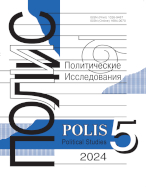The Crisis of World Order:
Russia’s Impasse and Resistance
Sakwa R.,
Professor of Russian and European Politics, University of Kent, Great Britain, R.Sakwa@kent.ac.uk
elibrary_id: 683723 | ORCID: 0000-0001-6678-8820 |
DOI: 10.17976/jpps/2016.06.05
Sakwa R. The Crisis of World Order: Russia’s Impasse and Resistance. – Polis. Political Studies. 2016. No. 6. https://doi.org/10.17976/jpps/2016.06.05
The only way for Russia to join the Atlantic community was through a process of transformation that was perceived to entail the repudiation of some fundamental elements that are considered constitutive of its identity, notably its autonomous political subjectivity and great power status. While Russia in the early post-Cold War years was ready to adapt to the exigencies of the world order represented by the Atlantic community, in the end the transformation demands proved too high. Russia increasingly felt trapped in a strategic impasse in which it could not join NATO or the European Union, yet its own space for sovereign development and great power interests were increasingly unable to find cooperative expression. The response was resistance and conflict. One form of this conflict was Russian support for forces that were disruptive of the Atlantic community, which is increasingly held responsible for the strategic impasse in which Russia found itself. For the first time since the fall of communism the idea of a ‘new world order’ is now once again on the horizon. The Cold War bipolar system will not be restored, but neither will a new ‘concert of powers’ take its place because of the great variety of actors with different ways of exerting influence. Neither element of the system will engage in deep integration but will instead retain general orientations with sufficient flexibility and economic potential to attract participants but not so exclusive as to generate bloc discipline.
See also:
Kazarinova D.B.,
Cold War and Peace: “Russia Against the Rest” and Four World Orders of R. Sakwa. – Polis. Political Studies. 2018. No4
Zagladin N.V., Kucherenko A.A.,
Global Crisis: Reasons, Consequences and Russia (Returning to What’s Been Read). – Polis. Political Studies. 2009. No3
Gorshkov M.K., Petukhov V.V.,
Foreign Policy Orientations of the Russians: a New Turn. – Polis. Political Studies. 2015. No2
Fedotova V.G.,
Distinctions of political cultures and the international conflicts. – Polis. Political Studies. 2015. No1
Oznobishchev S.K.,
“The New Cold War”: Reminiscences about the Future. – Polis. Political Studies. 2016. No1





.jpg)






 print
print
.jpg)
.jpg)